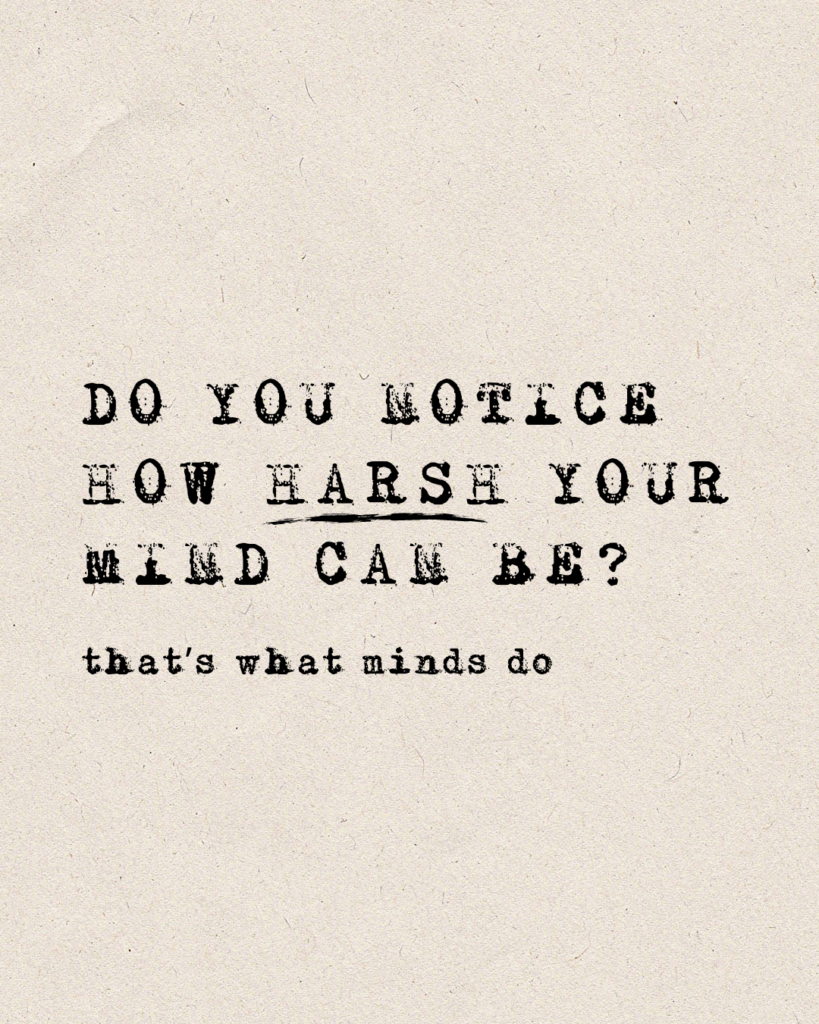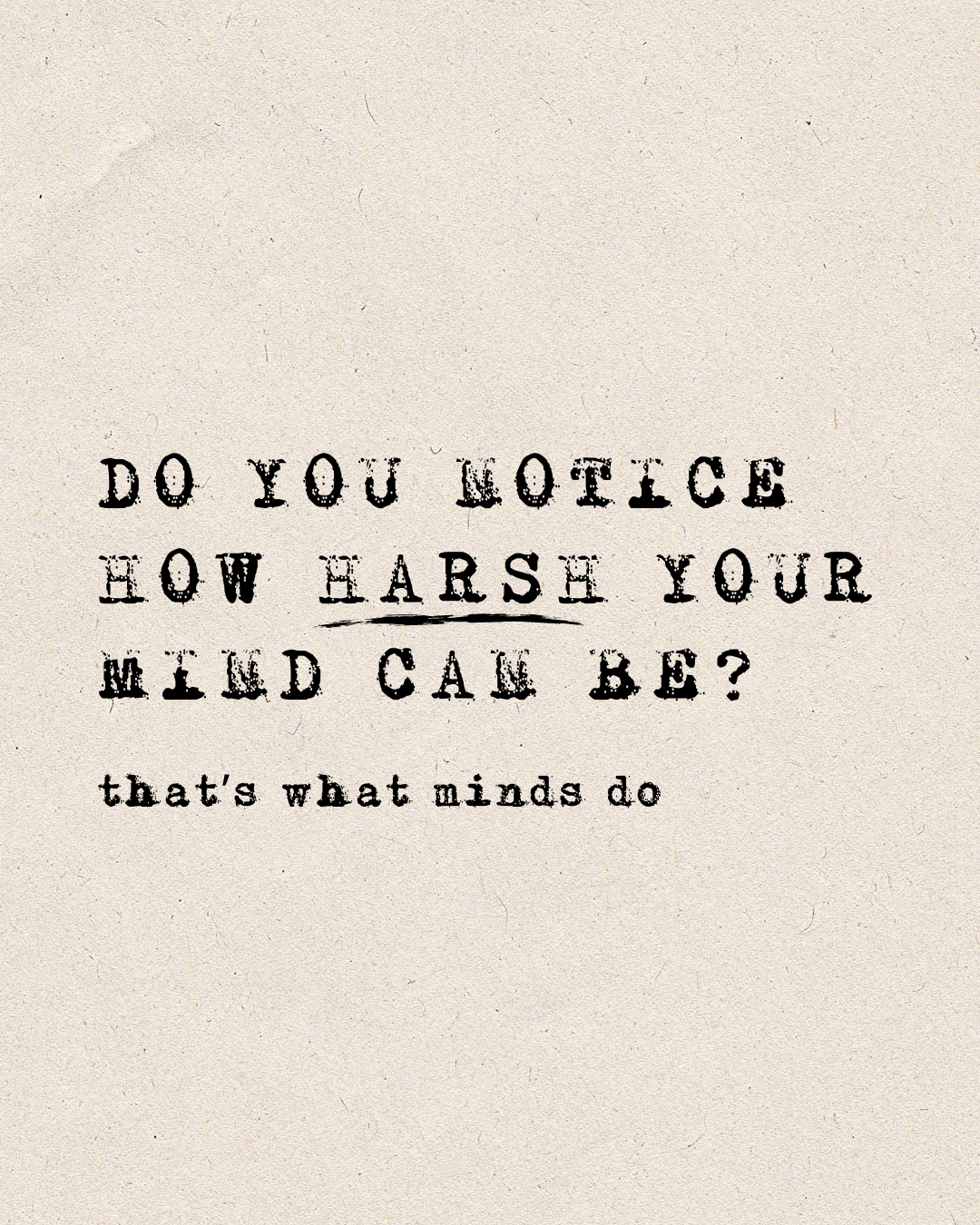In pursuing mental well-being, many of us fall into the trap of trying to control our thoughts, believing that by exerting enough willpower, we can banish negative thinking and find peace of mind. However, this approach often proves counterproductive when it comes to the relentless cycle of rumination. In this blog post, we’ll explore why attempting to control our minds is futile in the face of rumination and how acceptance and mindfulness can offer a more effective path toward inner peace and resilience.
Your mind is a machine, and it is constantly trying to keep you safe.
- your mind tries to protect you
- your mind helps you learn
- your mind helps you get the things you want
- your mind helps you avoid the things you don’t want
- your mind helps you change what you do so you can get better results
Your mind has a job to do, and sometimes, it does that job so well that you can get stuck in a back-and-forth struggle with it, unable to move forward.
Rumination involves obsessive thinking about an idea, situation, or choice especially when it interferes with normal mental functioning. – Merriam-Webster Dictionary
When your mind frequently gets stuck in rumination or overthinking, it can make it difficult to be the person you want to be or move forward. It can take you out of the moment so you are not as present as you wish to be with others. It can distract you from doing things toward your goals and pull you away from achieving them. This affects our relationships, careers, self-worth, and levels of depression and anxiety. It can cause an immense amount of stress and even burnout.
So, how do you feel better if you are caught in rumination or overthinking?
First things first: You don’t aim to feel better. Stop, Lacy. Why don’t I want to feel better? Of course, I do!
It’s surprising to people when I tell them feeling better is not the goal.
We all want to feel good and get out of feeling like crap, but if you make feeling better the goal, you trap yourself in a cycle of trying to manipulate and control your thoughts and feelings when you do not have any control when they arise. It becomes a futile struggle, and your brain is so intelligent it will keep coming up with new reasons to keep you in the feedback loop.
I have spent countless years trying to think more positively and look for ways to replace or rewrite negative thoughts with more helpful ones.
It didn’t work for me and ultimately led me to my current work.
I have since learned it is biologically normal for our brains to be predisposed to the negative, so now I accept negative thoughts as part of how our human brains work.
It is a relief to allow thoughts and emotions to arise no matter what they are and accept them as part of my normal existence rather than trying to wrestle them to the ground. Now I ride the highs and lows of my internal experience like a wave and ground myself using exercises like Dropping Anchor to bring myself back to the present and unhook from them.
Why trying to feel better doesn’t work…
- Control is a Fantasy: The more we strive to feel better or change our internal experiences, the more we may find ourselves trapped in a cycle of struggle and resistance.
- Avoidance Can Backfire: When feeling better becomes the sole objective, you could resort to avoidance strategies to escape discomfort. However, avoidance often perpetuates distress in the long run, reinforcing the idea that certain thoughts or emotions are inherently harmful or unacceptable.
- Acceptance Promotes Healing: By cultivating an attitude of acceptance and nonjudgmental awareness, we can create space for healing and growth, even in the presence of discomfort.
- Values-Driven Action: Rather than seeking to feel better in the moment, we can identify core values and commit to actions that align with those values. By focusing on what truly matters, we can derive a sense of purpose and fulfillment, regardless of our current emotional state.
- Mindfulness and Presence: Incorporating mindfulness exercises helps individuals develop present-moment awareness of their thoughts, emotions, and sensations. Observing your internal experiences with curiosity and openness can cultivate a greater sense of psychological flexibility and resilience.
So, what is the goal when struggling with overthinking, rumination, emotions, memories, or sensations?
The goal is to develop the skills necessary to navigate life’s challenges with grace and authenticity, regardless of the fluctuations in one’s emotional state.
And don’t worry! It doesn’t mean you won’t always feel good. Feeling better and more positive emotions like joy and happiness can be a byproduct of accepting our emotions and thoughts and taking value-based action.
You can learn helpful skills to accept the highs and lows of our internal human experiences rather than attempt to control or suppress them in pursuit of immediate relief.
🍌 Bonus: Here’s a fun exercise to illustrate why we cannot control what comes into our mind.
Try not to think about a banana right now.
Did you do it? Try to control the thought of a banana not popping into your head.

I’m serious. Quit overthinking about bananas.
Not so easy, right?
It’s enough to make you bananas.
Here are some steps you can use to help you unhook from thoughts that have you stuck in rumination or feel sticky.
#1 So instead of trying to control the thought of thinking about a banana, or trying to push it away or replace it with another piece of fruit, we can begin to stop struggling with it by simply noticing and accepting the thought about the banana altogether by saying out loud or to ourselves: “I’m noticing I am having a thought about a banana right now. Thanks, brain, for sharing that”. We are calling your brain out! I see that 🍌 banana for what it is, a thought in my brain.
That is the first part of the exercise. Notice and name the thought. After we notice and name the thought, the second bit is to return to what we are doing now so we can re-engage with the present moment.
#2 Coming back into your body is a way to ground yourself back to the present. You can try to squeeze your fists, roll your shoulders back, or press your feet into the floor. Stretch your arms over your head, flex your feet, or move your neck from side to side.
#3 Look around and notice where you are.
#4 Pick a few objects in the room and name them: lamp, chair, window, book.
#5 Listen and identify a few sounds in your environment: I hear birds chirping outside of the window. I hear the sound of my keyboard as I type this. I hear my breathing.
#6 Can you identify any tastes or smells?
Repeat steps 2-6 a few times and check in with yourself.
How are you feeling? If the thought still feels sticky or you are feeling unsettled, it’s OK! Remember, we aren’t trying to eliminate anything or make the thoughts or feelings disappear. This is a practice, and we can return to it throughout the day even when we don’t feel hooked to get used to bringing ourselves back to the present moment around us.
We notice and name thoughts to change our relationship with them, and by doing so, we become more observers of our thoughts and less influenced by them.
This post is related to this Instagram post here! #perfectionism #perfectlyimperfect #overthinking #analysisparalysis #anxiety #encouragement #peace






+ show Comments
- Hide Comments
add a comment